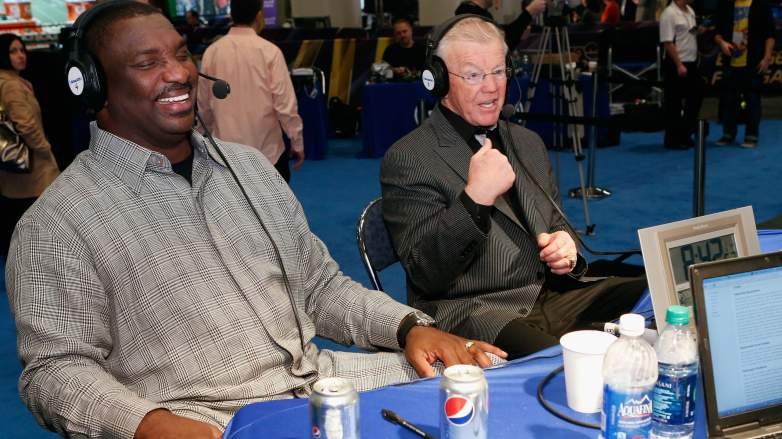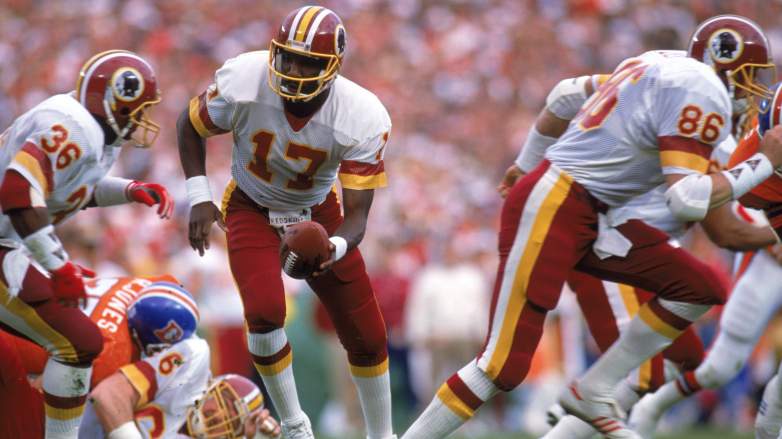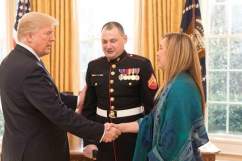
GettyDoug Williams and Joe Gibbs.
Thirty years ago, Doug Williams put together one of the best Super Bowl performances in history, leading that Joe Gibbs-coached Washington Redskins to a victory over the Denver Broncos in Super Bowl XXII on January 31, 1988. Like Philadelphia Eagles quarterback Nick Foles, Williams started the season as a backup before leading Washington to the championship game.
Williams was the first black quarterback to win a Super Bowl. He was named the game’s Most Valuable Player. Williams, now 62, and Gibbs, 77, will sit down Sunday on NBC before this year’s Super Bowl to look back at the historic victory.
Williams is the senior vice president of player personnel for Washington. He was named to the position last June after serving as a personnel executive for the team from 2014 to 2016.
Williams said during his introduction as the top personnel manager for Washington, “Standing here today, I’m a real humble individual and I’m going to say something my college coach used to always say to me. He ‘had to be the luckiest man in the world,’ and that’s how I feel this morning to be in this position, proudly. I’m humbled this morning. But it’s my job to lead the personnel department, and we’re going to do that with all the continuity that we have back here. So, I want to say thank you to [Team President] Bruce [Allen] again, thanks to Mr. [Daniel] Snyder for giving me this opportunity, and thanks to all of the fans in Washington, D.C.”
He told The Washington Post about his strategy for finding players, “Number one, character matters, and athletic ability matters a great deal. But I think at the end of the day, I don’t think you can pick the size, because when you think about it, we got a little guy on our football team by the name of Jamison Crowder. Probably the toughest football player in the league. So, you can’t say we don’t want little guys. But what we really want is good football players. I think at the end of the day, we’re going to see, ‘Could he play football? And ‘Does he help us win the Super Bowl?’”
Before taking over the Redskins front office, Williams, who retired as a player in 1989, spent time in coaching, including as head coach at Morehouse and his alma mater, Grambling State, before being hired as a personnel executive by the Tampa Bay Bucaneers in 2004. He spent a year as the Bucs’ coordinator of pro scouting and then a year as the general manager for the UFL’s Virginia Destroyers.
Williams and his wife, Raunda, have eight children, Ashley; Adrian; Doug, Jr.; Jasmine; Laura; Lee; Temessia; and Carmaleta. His son, Adrian, played football at Brown, while Doug Jr. played for Williams at Grambling State.
Gibbs, meanwhile, is now 77 and a member of the Pro Football Hall of Fame. He left the Redskins in 1992 and then retired from coaching in 2007 after a second stint as Washington’s head coach. Like Williams, Gibbs is still a part of the Washington organization, serving as a special advisor to team owner Daniel Snyder.
He lives in Charlotte, North Carolina, with his wife, Patricia. They have two sons and eight grandchildren.
After retiring from football the first time, Gibbs started a NASCAR team, Joe Gibbs Racing, which he still owns today. The day-to-day operations are run by his son, J.D. Gibbs. The company also fields cars in the National Hot Rod Association (NHRA) and sponsors motocross and supercross teams.
Williams was a pioneer for other black quarterbacks.
“There’s not a day that goes by that I don’t” think about it. Not for what it meant to Doug Williams but because it was about much more than Doug Williams. It meant a lot to a whole lot of other people. All the political angles, what people would say depending on what I did, I knew all of that going into the game. But I tried not to put myself above the team and make it all about Doug Williams,” he told The Undefeated in a recent interview looking back at the game on the 30th anniversary. “I realized that no matter what happened, I was going to be a part of black history. For me, the best way to be talked about in black history was for the team to win the game. I didn’t want to be a part of black history and get my a– kicked. That’s why I always remembered the fact that the Redskins didn’t bring me to San Diego just to show off their black quarterback. I went to San Diego as the Redskins’ starting quarterback. And I went there to win.”
Williams and Washington trailed 10-0 heading after the first quarter. He then orchestrated a five-touchdown second quarter and the Redskins went on to a 42-10 victory over the John Elway-led Broncos. It was the second of Gibbs’ three Super Bowl victories.
“Obviously, what he did that day … Doug really played great. Our offense played great and our defense played great. Our defense doesn’t get enough credit for what it did, and I’ve always felt badly about that,” Gibbs told The Undefeated. “But it was just something about [that day]. I could have closed my eyes, stuck my finger on that play chart, called whatever was there and it would have gone for 8 yards. Every play … it was just amazing. I’ve never experienced anything like that, before or since.”

GettyDoug Williams during Super Bowl XXII.
Williams had started that season as the backup to quarterback Jay Schroeder. After an injury to Schroeder and ineffectiveness upon his return, Gibbs picked Williams to be his starter in the playoffs.
Leading up to the Super Bowl, Williams was asked questions about being a black quarterback.
“I knew it was history-making,” Williams told the Washington Post recently. “But for me, I couldn’t look at it that way. Everybody else was making a big deal out of it, but I had to look at it as,’‘What is best for the Washington Redskins?'”
He added, “It’s all about opportunity. If Joe Gibbs, and Bobby Beathard and Jack Kent Cooke hadn’t given me the opportunity 30 years, ago, we wouldn’t be sitting here having this conversation.”
Williams almost missed out on his opportunity to shine, as Washington nearly traded him before the season, according to Redskins.com:
Well I had been traded. We had played a preseason game in L.A. against the Rams and came home and flew here overnight. When the plane landed I got off and [general manager] Bobby [Beathard] and [head coach] Joe [Gibbs] were down at the bottom of the plane saying hey we just made a deal with the Oakland Raiders. I was ecstatic because I knew [quarterback] Jay [Schroeder] wanted to start, and I had a chance to go to Oakland, which played the type of ball that I would have loved to have played even here.
[Gibbs] said ‘Meet me in the office at 11:30 and we’ll talk about it.’ I sat around the office I had called everyone in my home town and packed my bags and I didn’t have anything in my apartment except for a couple of bags and I was ready to go. When I was sitting there waiting on him, his secretary Barbara said he’ll be there in a minute so when he came in I went in and coach looked at me and said, ‘Douglas, I changed my mind.’ I looked at him and said, ‘Coach you can’t change your mind.’ That was the first time I’ve ever seen him get mad. He looked at me and said, ‘I don’t work for [the] Raiders, I work for the Washington Redskins.’ I sat back in my chair, and after that he started talking and told me that, ‘I got a gut feeling that somewhere along this season you are going to come in here and we are going to win this thing.’ At that time those words didn’t mean anything to me. We were talking about the end of the season I’m talking about now, and after that I left his office and didn’t say another word and just prepared and got ready to go if my number was called.

Comments
Doug Williams & Joe Gibbs: Where Are They Now 30 Years After Super Bowl Win?